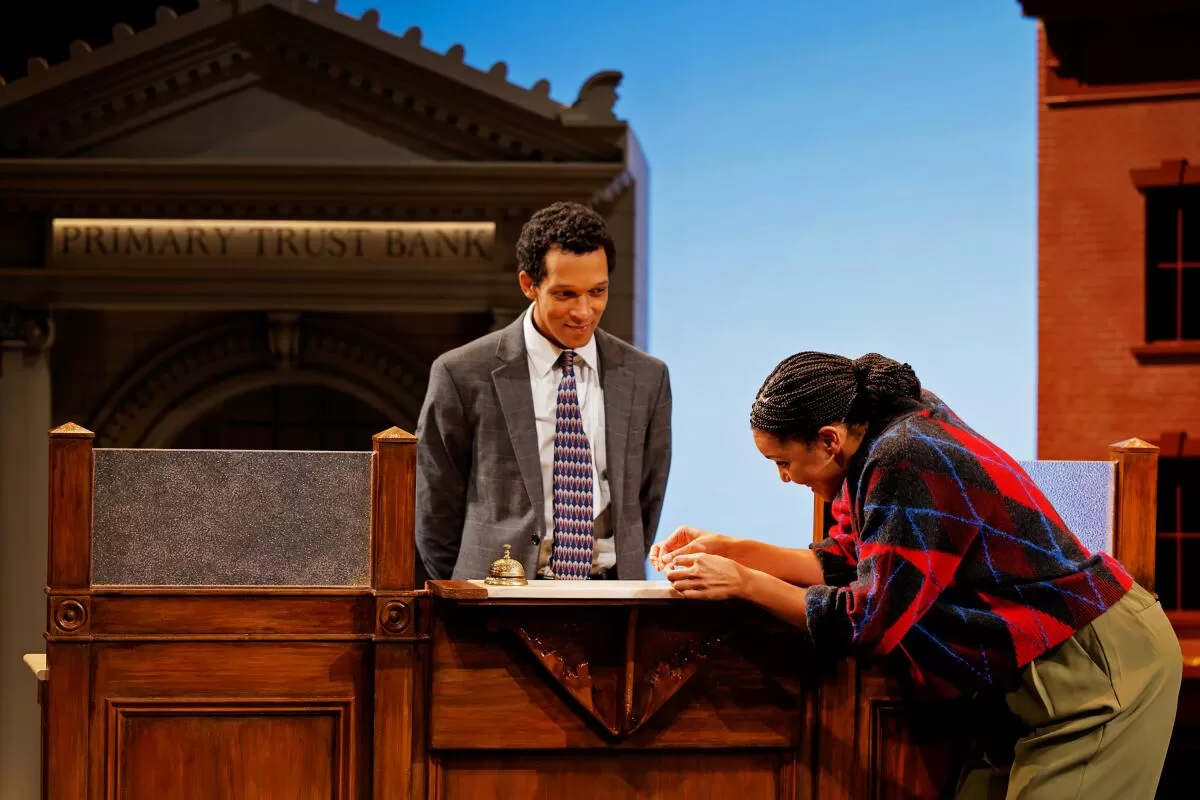Eboni Booth’s “Primary Trust” won the Pulitzer Prize for drama this year, but don’t expect a grand epic. This is a quirky, small-scale, quietly reflective work that’s as tenderhearted as it is spryly comic and as poignant as it is ultimately uplifting.
It’s refreshing to see such a prodigious honor bestowed on a piece of writing that’s content to go about its human business without the need to inflate its own importance. Booth knows there’s value in every life, no matter how obscure or unimpressive. The compassionate attention she lavishes on her gentle, troubled protagonist opens up an entire world, if you’re willing to take in what’s been hiding in plain sight.
The play, which is receiving its West Coast premiere at La Jolla Playhouse, revolves around 38-year-old Kenneth (Caleb Eberhardt), who lives in Cranberry, N.Y., a suburb of Rochester with a town center that seems frozen in time. There’s a post office, a church, a couple of banks, a used-book store, where Kenneth works, and Wally’s, a tiki restaurant, where Kenneth goes every night to get blotto on happy hour mai tais.
There aren’t many Black people in Cranberry, Kenneth acknowledges, but he’s not the only one. And most people treat him well, he says, except that one incident at the dairy farm that he’d rather not talk about right now.
He’s telling a different story, the story of his loneliness. And how his world unexpectedly transformed through the grace of other people taking an interest in him. Race isn’t his subject, though it’s a compounding factor in his extreme alienation, which Booth chooses to examine in the universal terms of a modern fable, unlimited by demographic or diagnostic categories.
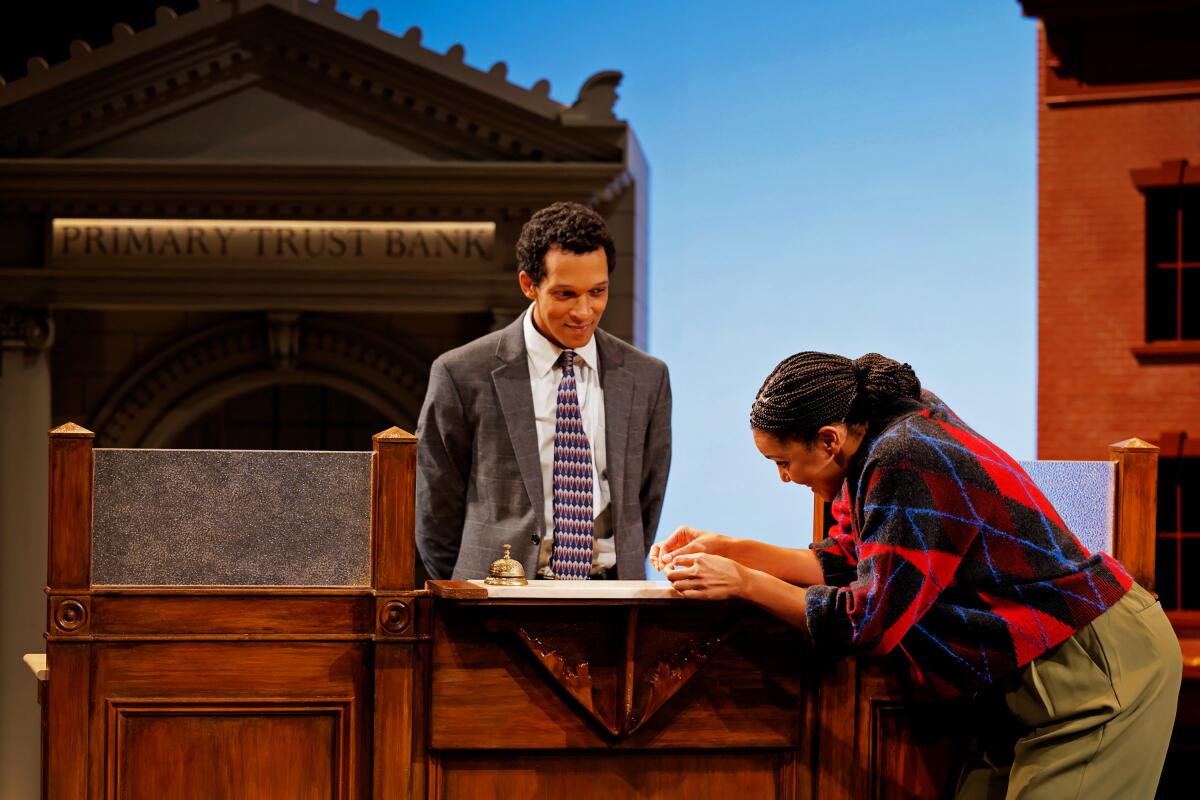
Caleb Eberhardt, left, and Rebecca S’manga Frank in La Jolla Playhouse’s West Coast-premiere production of “Primary Trust.”
(Rich Soublet II)
Kenneth’s life is a life of routine. There aren’t many options in this small town, and Kenneth seems to prefer it that way. His evening ritual is spent getting drunk with his only friend, Bert ( James Udom).
The thing about Bert is that he isn’t real. (This revelation happens early in the play, but it’s still something of a shock because Bert is 100% real in Udom’s impressively grounded performance.) Kenneth knows that talking to someone no one else can see might make him seem strange. At Wally’s, the waitstaff seems to think he’s just drunk, which is better than being crazy in these parts. So he skates by as the town’s solitary eccentric.
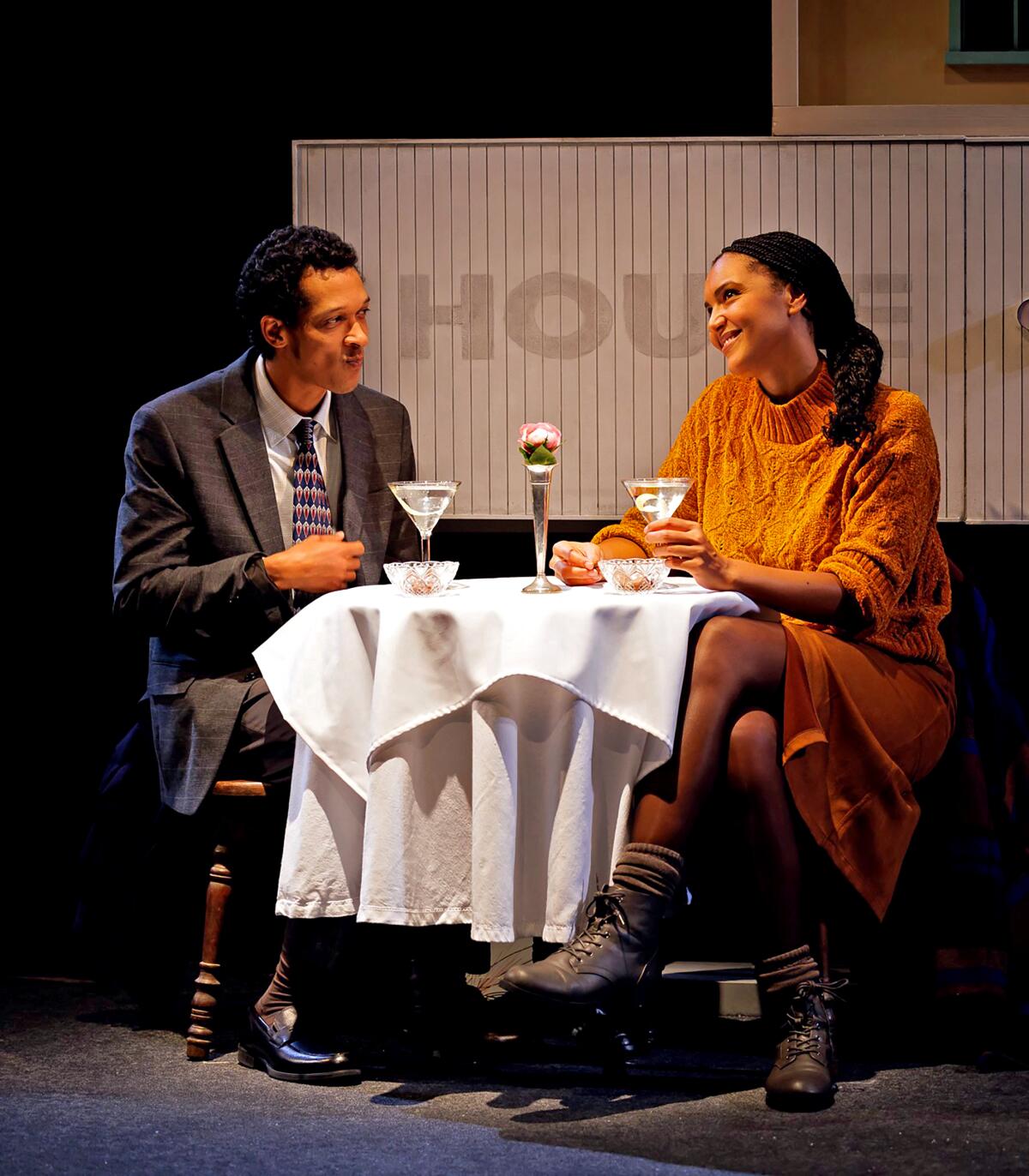
Caleb Eberhardt, left, and Rebecca S’manga Frank in La Jolla Playhouse’s West Coast-premiere production of “Primary Trust.”
(Rich Soublet II)
But the status quo, such as it is, can’t continue. Sam (James Urbaniak), the owner of the second-hand book store who has employed Kenneth for 20 years, is selling the business and moving to Arizona for his health. He’s been like a surrogate guardian, something Kenneth, who was orphaned at age 10, has badly needed, even if the only person he’s been willing to socialize with is Bert.
Kenneth is despondent about his future until Corrina (Rebecca S’manga Frank), a waitress at Wally’s, tells him to apply for a job at one of the banks. And just like that, he gets hired at Primary Trust, despite bombing the interview. Clay (Urbaniak, morphing from an alter kaker bookstore owner into a rah-rah bank manager) develops an instant soft spot for Kenneth, who struggles to answer the simplest of questions and reminds Clay of his brother, who was never the same after a car accident.
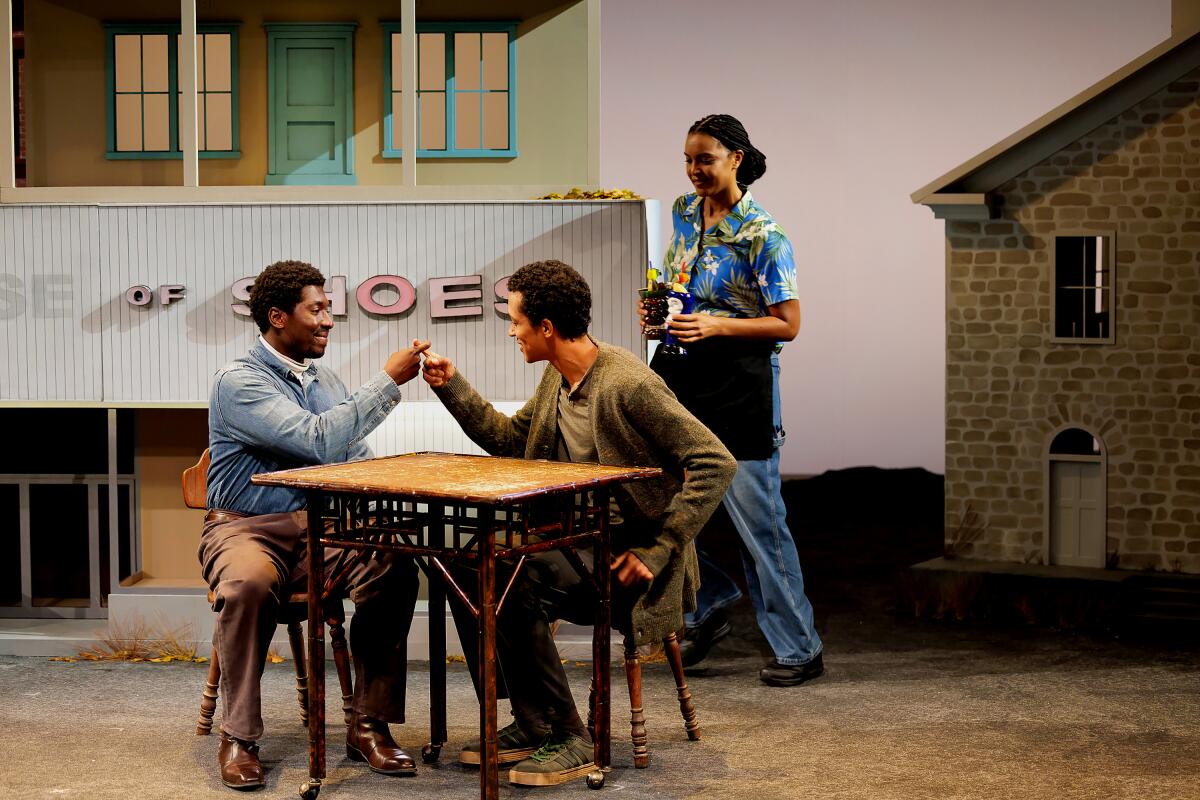
James Udom, from left, Caleb Eberhardt and Rebecca S’manga Frank in La Jolla Playhouse’s West Coast-premiere production of “Primary Trust.”
(Rich Soublet II)
How Kenneth’s life turns around by the patience of other people is the miracle of this 95-minute drama. “Primary Trust” moves between Kenneth’s direct address narration and loose-limbed dramatization. Urbaniak and Frank play an assortment of characters. In addition to Kenneth’s two bosses, Urbaniak pinch-hits as a waiter with a farcical French accent. Frank, who gives emotional texture to Corrina, hams it up as a string of Wally’s waiters and bank customers.
Knud Adams, who directed the Roundabout Theatre Company’s world premiere of “Primary Trust,” stages the play with an amiable lightness that exemplifies Cranberry’s motto: “Welcome Friend, You’re Right on Time!” The small cast, much like a small town, manages challenges with a neighborly wink. The simplicity is endearing.
Marsha Ginsberg’s scenic design creates a “Mister Rogers’ Neighborhood” playground for adults. The live musical accompaniment of Luke Wygodny, who falls into perfect time with the actors, no matter what instrument he picks up, draws out the lyricism of the writing.
“Primary Trust” unfolds like a musical poem. There are echoes throughout the play — folksy sayings that keep repeating (“pardon my French” after someone says a bad word), fragments of stories from Kenneth’s life, scripted greetings from the staff at Wally’s, the same old drink orders — that function like parts of a song.
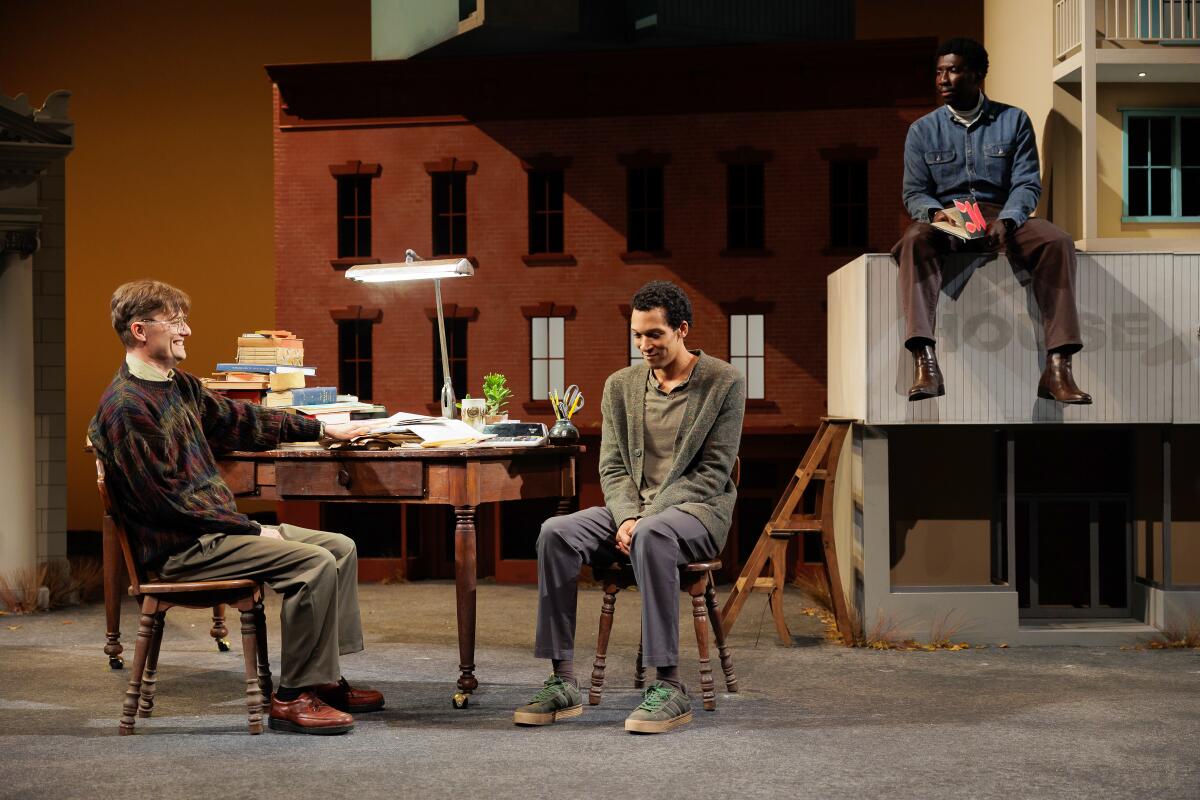
James Urbaniak, from left, Caleb Eberhardt and James Udom in La Jolla Playhouse’s West Coast-premiere production of “Primary Trust.”
(Rich Soublet II)
An important sound in the play is a bell that Wygodny taps at regular intervals, often at moments when a line is spoken that lingers awkwardly in the air. Kenneth’s story isn’t an easy story to tell. The death of his mother, who moved to Cranberry on her own when she was still pregnant with him, was traumatic in a way that he is still trying to process. Working at a bank like she once did helps to make him feel connected.
There were moments when I wondered why Kenneth wasn’t getting the mental health care he clearly needs. An imaginary friend is one thing for a child and quite another for a 38-year-old man who drinks excessively with this figment every night. But the play doesn’t want us to medically diagnose him. Rather, it asks us to attend to his life and to take note of how basic social support and everyday kindness can give structure and purpose to someone struggling to find his way.
Eberhardt, who was in the recent Broadway revival of “An Enemy of the People,” anchors Adams’ production with a sweet vulnerability. His Kenneth is deeply wounded, and Eberhardt’s tall, lean presence seems to collapse into itself, as though Kenneth wished he were as invisible as Bert (who, it turns out, isn’t entirely fabricated). People are instinctively nice to Kenneth because there is something intrinsically noble about him. He’s bright, courteous and helpful — and extremely good at minding his own business.
You’ll root for his happy ending, even as Booth is too good a writer to turn the play into a saccharine fairy tale. The strides Kenneth makes are modest but genuine. Slowly but surely, he regains, with a little help from his new friends, a sliver of the primary trust that was lost when his mother died.
‘Primary Trust’
Where: Mandell Weiss Forum, La Jolla Playhouse, 2910 La Jolla Village Drive, La Jolla.
When: 7:30 p.m. Tuesdays-Fridays, 2 and 8 p.m. Saturdays, 1 and 7 p.m. Sundays. Ends Oct. 20
Ticket: Start at $74
Contact: LaJollaPlayhouse.org; (858) 550-1010
Running time: 1 hours, 35 minutes
